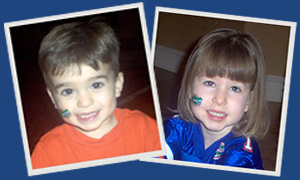
 |
At future recall visits or semi-annual check-ups we would prefer that a parent accompany their child into the treatment area at least until age eight or nine. This allows us to provide continued dental education, oral hygiene instruction and to maintain a direct open line of communication with the parent throughout the visit. |
Discussions regarding possible treatment recommendations and/or options can also be streamlined throughout the visit, instead of while in the waiting room after the examination. These check-up visits typically take 30 to 45 minutes, depending upon the age of the child. Older children or those wearing fixed orthodontic appliances tend to have more tenacious staining and calculus build-up, thus cleanings may take a bit longer. Pediatric cleanings tend be a bit shorter than adult check-ups, as children normally don’t have extensive periodontal concerns, heavy calculus beneath the gumline, and realistically have a much shorter attention span. Each recall visit will include:
- A comprehensive examination of the teeth, jaws, bite, gums, intraoral & extraoral hard and soft tissues.
- A dental prophylaxis or tooth polishing.
- Scaling or removal of hard calculus above and below the gumline.
- Diagnostic radiographs.
- Evaluation of facial growth & development.
- Oral hygiene instructions, especially brushing & flossing.
- Application of a professional topical fluoride.
- Assessment of the need for more regular fluoride exposure, both topical and systemic.
- Frank discussion regarding our professional findings, including recommendations.
Restorative Visits. At subsequent restorative visits, our staff may recommend that your child enter the dental operatory room on their own or may have a parent first help them get situated in the dental chair and then return to the waiting room. During these type visits, your child will always be accompanied by a dental assistant. Most parents agree that children tend to be more cooperative for other adults, especially uniformed professionals, than for their own parents. This is because your own child understands exactly how to their responses effect your underlying emotions. When accompanied by a parent, children almost exclusively focus on the parent in an attempt to elicit a response. This, in turn, makes it much more difficult to provide safe and effective care. It has been proven that children are also effective at reading anxiety and fear in a parent’s expressions and mannerisms. On the other hand, when a parent is not present during care, children tend to focus directly on the doctor and dental assistant who are continuously providing calming explanations, directions and distractions throughout the appointment.
| Children also subconsciously understand a level of trust that accompanies allowing them to be escorted by a dental assistant alone for care. They realize that their parents would never put them in a situation where they could be harmed, therefore this provides a calming effect. However, we ask that should you not be completely comfortable with this method, please discuss this well prior to your child’s restorative visit. |
|
We are happy to discuss additional options, such as obtaining periodic updates while in the waiting room, sneaking a peek into the operatory during treatment, or even remaining in the operatory room throughout the visits. We try to approach each patient’s care individually, and thus are always open to any of your recommendations. Ultimately, we want both you and your child to be completely comfortable at every visit to our office. Should you decide that you want to remain in the room during treatment, we will need to know well in advance so we can schedule additional treatment time, as these visits typically take longer to complete. Parents sometimes inquire about how to describe upcoming treatment to their child prior to a restorative visit. Because most young children (under age 5) typically are not yet equipped with coping skills, we suggest that parents avoid providing too many details about impending treatment. Words such as "needle,” “shot,” “pull," "hurt," “blood,” “pain,” or "drill," should be avoided, as these tend to illicit negative emotions which have been found to dramatically increase pre-operative anxiety and thus precipitate poor cooperation. We recommend using easy to understand explanations, such as they have several “sugar-bugs” in their teeth that the dentist wants to remove. You may add that we may spray some, “sleepy juice” around the sick tooth which will eliminate any discomfort. In most cases, we are able to use various methods to distract the child from realizing that they are actually getting an injection and those individuals that don’t expect this, normally do perfectly fine. However, those children that have been pre-warned of this impending procedure are often very jumpy, anxious and tend to be uncooperative from the onset of the visit. Once a child is numb, our treatment becomes dramatically easier. We also recommend that parents of younger children schedule visits early in the morning when kids seem to be more alert and fresh. If possible, try to avoid scheduling visits just before their normal nap time.
|